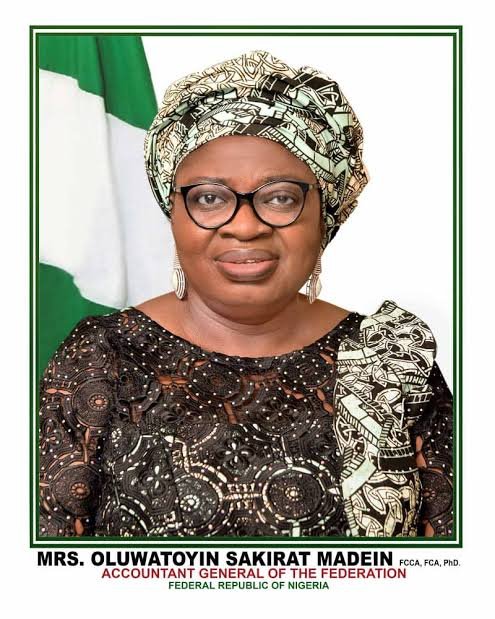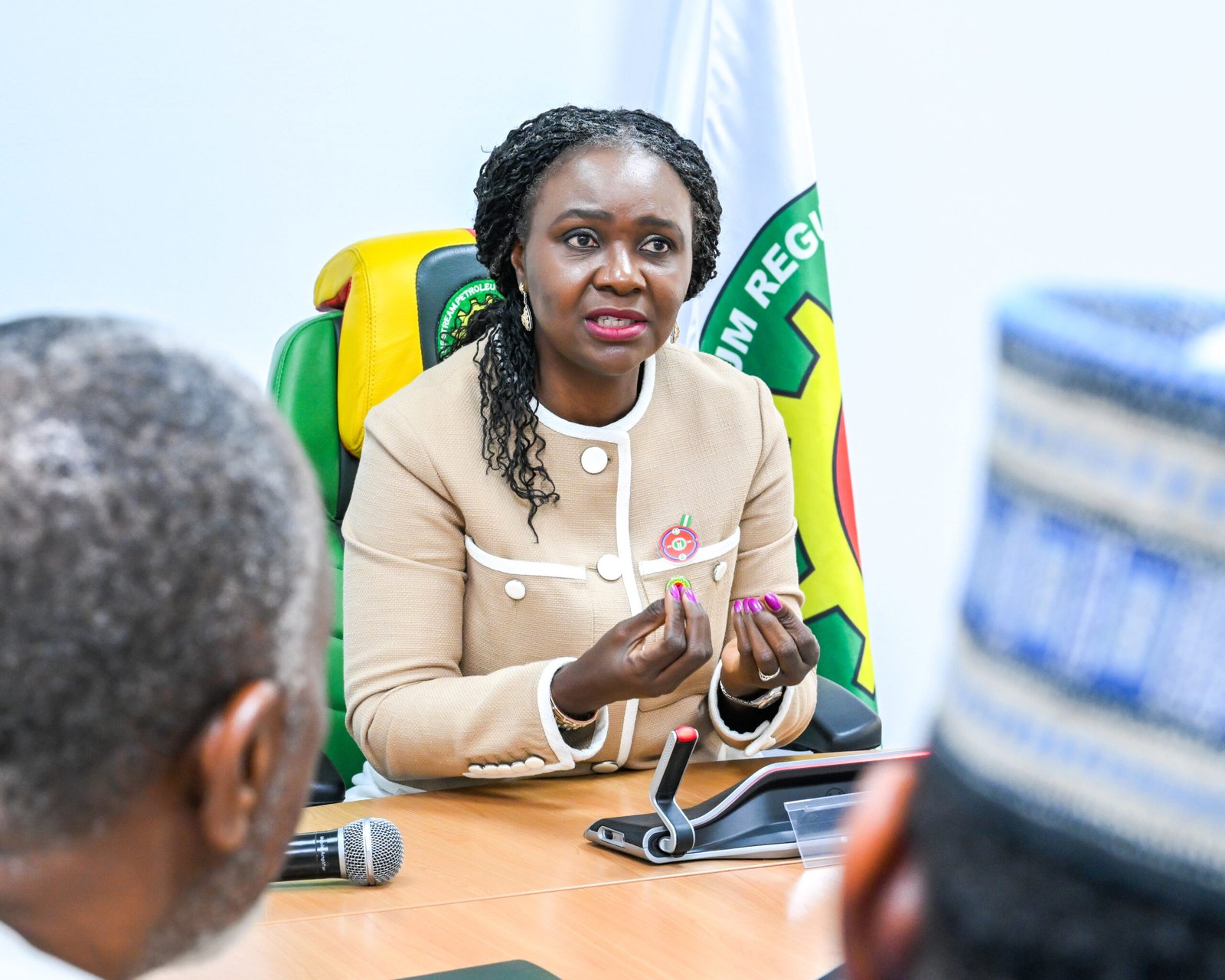Opinion
Madein: Celebrating A Track Record Of Excellence In Public Service

By Akutah Akutah
When Dr. Mrs. Oluwatoyin Madein FCCA, Ph.D. was appointed as the Accountant-General of the Federation on May 18th, 2023, she drew upon her wealth of experience and hindsight to drive institutional reforms in Nigeria. With unwavering determination and equanimity, she set out to revolutionize the country’s financial system, bringing sanity and transparency to the forefront.
With an illustrious career spanning over 32 years, Dr. Madein has evolved into a trailblazing figure in the national and international financial sector. Her exceptional qualities, coupled with her refined intellectual prowess, have earned her recognition as a leading expert in her field.
As the Chief Accounting Officer of the Federation, Dr. Madein’s primary focus was on establishing a robust accounting system across all departments of the nation’s treasury. Her exemplary supervision of public revenue receipts and federal government expenditures garnered the respect and confidence of both the workforce and the presidency.
Dr. Oluwatoyin Madein’s rise to the top of her profession attests to her exceptional worth, value, and personality. Her historic appointment as the Accountant General of the Federation is the culmination of her years of selflessness, resilience, and incorruptibility. As an indispensable accountant, financial manager, internal auditor, and former Director of Finance and Accounts, her selection from 19 shortlisted candidates is a clear indication of her excellence.
This achievement not only showcases her intellectual prowess, experience, and astuteness but also marks a significant milestone as the first female professional Accountant General of the Federation. She succeeds a long line of male occupiers of this position, including Chukwuyere Anamekwe and Sylva Okolieaboh.
Dr. Madein’s impressive educational background laid the foundation for her success. She obtained her Higher National Diploma in Accountancy from Ogun State Polytechnic in 1988 and later earned a Postgraduate Diploma and Master’s in Business Administration from Ogun State University. In recognition of her contributions to the accountancy profession, she was awarded a Doctor of Business Administration (Honoris Causa) by Commonwealth University in 2019.
A core professional Accountant and Fellow of the Association of Chartered and Certified Accountants (ACCA), UK, Maidein holds membership in various scholarly and professional bodies, including the Member of the Association of National Accountants of Nigeria and the Institute of Chartered Accountants of Nigeria (ICAN). Her quest for intellectual capacity development drove her to acquire a Doctoral Degree in Management Finance in 2020 from the prestigious Walden University, in Minnesota, United States.
For over 30 years, Madien gave her life to the service of the fatherland beginning as a middle-level officer from the Raw Materials Research and Development Council (RMRDC) and later as a pioneering staff for both the Family Economic Advancement Programme (FEAP) and National Poverty Alleviation Programme (NAPEP).
Her career in the Civil Service also took her through various Ministries such as the Ministry of Police Affairs, Commerce and Industry, Works and Housing and the Ministry of Youth and Sports Development, Abuja. A quintessential and broadminded goal-getter, she first explored the dynamics of the private sector as she worked as an Executive Officer (Accounts) in Ogun State Property and Investment Corporation (OPIC), Abeokuta bringing in her home-thought discipline, ruggedness and godliness.
One of Dr Madein’s track record of achievements worthy of celebration includes the establishment of the Office of the Accountant General of the Federation (OAGF) Library. The multi-dimensional and internationally acclaimed state-of-the-art library is charged with the responsibility of providing relevant information resources to support OAGF activities towards the achievements of its mandate.
Accordingly, from its inception, the Library provides print, non-print and e-resources for consultation, research, planning, and recreation; and for effective and efficient public service delivery, with specific schedules for collecting developments and the organization of the Library resources. The library also renders E-Library services and reference/readers services as well as documentation services, reprographic services, and online services. Other services rendered by the library include; indexing of materials/ publications, and bibliographic compilation
To ensure the effective and efficient implementation of the Public Financial Management Reform Initiatives of the Federal Government, Madien took requisite steps aimed at permanently resolving the observable and avoidable lapses associated with potential threats to the efficient and continuous implementation of the Financial Management Reform Initiatives.
To achieve higher and long-lasting efficiency in financial probity, accounting and transparency, she deliberately decided to build on the gains of the President Buhari administration in the implementation of the Financial Management Reform Initiatives, particularly the Treasury Single Account (TSA), Integrated Personnel Payroll Information System (IPPIS), International Public Sector Accounting Standard (IPSAS), Government Integrated Financial Management Information System (GIFMIS), and Assets Tracking Management Project (ATMP).
This has led to an upward growth in the trajectory of the revenue of the Federal Government, thereby adding billions of naira and cutting down on the incidence of ghost workers syndrome since the implementation of the Integrated Personnel Payroll Information System (IPPIS).
Her dynamic and resourceful leadership also led to the adoption of the International Public Sector Accounting Standard (IPSAS), which has enhanced the nation’s transition from Cash-Based Reporting to Accrual-Based Reporting, while the implementation of the Government Integrated Financial Management Information System (GIFMIS) has also led to the centralization of government’s budgeting and expenditure.
A result-oriented and focused leader, Dr Madein undertook an in-depth review of the financial reforms aimed at injecting new ideas and strategies into the series of reform projects, thereby sustaining the gains so far recorded. One area that has led to a radical, rapid transformation and improvement in the operations of the IPPIS payment platform was her deliberate engagement and consistent brainstorming and dialogue with IPPIS Service providers, providing robust engagement opportunities, discussions, and actionable plans.
Another track record for celebration is her determination to give legal bite to the Public Finance Management (PFM) Reform initiatives and the operations of the Treasury of the Federation as it reflects the Renewed Hope Mandate of the Tinubu Administration. The imperative of a new and more effective Law is more relevant because presently the principal legislation in operation has become obsolete and inadequate to support the Public Finance Management (PFM) Reforms envisaged by the Bola Ahmed Tinubu’s administration.
The accent to the law of the Public Finance Management Bill will certainly repeal the Finance Control and Management Act 1958 as well as enhance the legal framework for the operations of the Treasury, institutionalize the Public Finance Management (PFM) Reforms, and regulate the management of public funds.
In a conscious move to consolidate the gains of transparency, accountability and judicious public-oriented, which remains her abounding legacy, and in compliance with the Freedom of Information Act, Dr Madein conscientiously sustained the policy of publishing the details of the Federation Accounts Allocation Committee (FAAC) revenue distribution to the three tiers of government.
Her aim, without prejudice, is to ensure that citizens are carried along on the path of revenue distribution, inflows and expenditures, to keep Nigerians informed of the revenue trajectory and distribution of the Federal Government as this will generate more interest as well as balance government performance with revenue inflows at all levels.
A transparent and adroit personality, Mrs Madien ensure continuous checks and balances thereby enhancing accountability and transparency in the administration and disbursement of the Federation Account.
Putting words to action, Madien’s absolute conviction and workers-friendly posture have led to enviable capacity development initiatives, replicant in human capital development, staff training and technical-knowledge upgrade of the workforce, across all cadres, leading to efficient and result-oriented performance.
Dr. Madien’s several reforms also take into consideration the challenges and complexities of the evolving financial global trends, creating sustained measures of tackling them, while ensuring the highest standard of achievements.
Accordingly, she has, through her many years in the service brought about sustained closer and a better-assured collaboration between her different offices and like-minds, and these days between her office and the ASCON, in agreement with other approved training institutes to provide capacity development training for OAGF staff.
Dr. Oluwatoyin through the years has displayed and demonstrated a woman of grace, valour and enduring consistent focus. This has led to various groundbreaking achievements and result-oriented services to humanity and posterity. Steadfastly and unwaveringly, she has inevitably created solid in-roads into ensuring that the Federal Treasury Academy at Orozo, Abuja becomes the premier institution for developing human capacity in public finance management.
Through her various interventions and the creation of a continual robust working ambience, she has inspired unity, solidarity and franchise. Her practical initiatives have led to the prompt and continuous release of funds to the MDAs and the three tiers of government, leading to an upward surge and holistic spatial distribution of development projects across the country and with all the MDAs of government.
Another radical transformative move of Dr Madein is her impact and efficiency in both the management of men and materials. Recently, she has been able to stall the cash collection of revenue by Revenue Agencies, a practice that was fraught with corruption, and leakages in revenue collection. Her adaptive formula for revenue collection has led to a better, more improved and more efficient method of revenue collection.
The creation of Cooperative Societies in Ministries, Departments, and Agencies (MDAs) of government seems by far to be one enduring legacy of an impactful career. Through it, she has created a motivated, better, secure and prudent workforce, with enhanced provision of handy financial aids and rehabilitation.
Indeed, for Madeine it has been many years of celebration and an enviable track record of excellence in public service. She has nothing else to prove except for the memories of a profound impact on humanity and the service of the fatherland.
***Akutah, a retired civil servant, writes from Abuja
Opinion
No More Pipeline Vandalism in The Niger Delta, But…

APPRAISING MILITARY RESOLVE AND THE PATH TO SUSTAINABLE OIL SECURITY
By Aaron Mike Odeh
On a recent media assessment visit by the Director, Defence Media Operations, Major General Michael E Onoja on the 20 January 2026, the General Officer Commanding (GOC), 6 Division of the Nigerian Army and Commander Land Component Operation DELTA SAFE, Major General Emmanuel Emeka, stated that there will be “no more pipeline vandalism in the Niger Delta” indicating a strong affirmation of military resolve and institutional confidence in the ongoing operations within Nigeria’s most economically strategic region.
Far from being a casual statement, the pronouncement reflects the operational posture, command clarity, and renewed determination of the Nigerian Armed Forces (AFN) under the leadership of General Olufemi Oluyede. It signals a clear message: the era of unchecked sabotage of national economic assets is being decisively confronted.
CONTEXTUALISING THE GOC’S DECLARATION
Statements of this magnitude from a serving GOC carry both symbolic and operational weight. They are rooted in firsthand command experience, intelligence assessments, and measurable gains on the ground. In this regard, Major General Emmanuel Emeka’s assertion should be understood as a projection of confidence derived from sustained military engagement, improved coordination with sister security agencies, and enhanced operational discipline within the 6 Division’s area of responsibility.
The Niger Delta has long posed complex security challenges due to its difficult terrain, extensive pipeline networks, and the activities of organised criminal syndicates. Against this backdrop, the GOC’s declaration underscores a belief that the Nigerian Armed Forces has reached a level of operational advantage sufficient to deter, disrupt, and dismantle pipeline vandalism networks.
OPERATIONAL GAINS AND MILITARY PROFESSIONALISM
Under Major General Emmanuel Emeka’s command, the 6 Division has intensified patrols, improved intelligence-led operations, and sustained pressure on illegal refining camps and crude oil theft routes. These efforts align with the Federal Government’s strategic objective of securing oil infrastructure as a matter of national economic security.
The GOC’s statement therefore reflects not mere optimism, but a professional assessment of the division’s growing capacity to dominate the operational environment. It also reinforces the Nigerian Armed Forces constitutional role as a stabilising force, committed to safeguarding national assets in support of economic recovery and investor confidence.
THE “BUT”: BEYOND KINETIC SUCCESS
While commending the resolve and achievements of the 6 Division, it is equally important to situate the declaration within a broader national framework. The “but” in the statement should not be interpreted as doubt or contradiction; rather, it represents an acknowledgment of the multifaceted nature of pipeline security in the Niger Delta.
Pipeline vandalism has historically been sustained not only by criminal intent, but also by socioeconomic pressures, environmental degradation, and the absence of alternative livelihoods in some host communities. Military success, while indispensable, achieves greater durability when complemented by effective civil governance, economic inclusion, and community trust-building.
COMMUNITY ENGAGEMENT AS A FORCE MULTIPLIER
One of the strengths of recent military operations in the Niger Delta has been improved civil-military relations. The success of the Armed Forces is closely tied to cooperation from local communities, traditional institutions, and credible stakeholders.
Sustainable pipeline security is most effective when host communities become partners in protection rather than passive observers. The GOC’s declaration implicitly places responsibility on all stakeholders—government agencies, oil companies, community leaders, and youths—to consolidate the gains made by the Armed Forces.
INSTITUTIONAL SYNERGY AND NATIONAL RESPONSIBILITY
The efforts of the 6 Division do not exist in isolation. They form part of a wider national security ecosystem involving regulatory agencies, intelligence services, law enforcement bodies, and policy institutions. The GOC’s confidence should therefore inspire complementary actions across these sectors.
Oil companies must uphold environmental standards and transparent community engagement. Regulatory bodies must enforce accountability. Development agencies must deliver visible dividends of peace. These non-military actions reinforce the security umbrella provided by the Nigerian Armed Forces.
LEADERSHIP AND STRATEGIC MESSAGING
Major General Emmanuel Emeka’s statement also serves as strategic communication—boosting troop morale, reassuring investors, and reinforcing public confidence in the Armed Forces of Nigeria. Such leadership messaging is essential in shaping national narratives around security, discipline, and state authority.
By articulating a firm stance against pipeline vandalism, the GOC is not only commanding troops, but shaping expectations and setting benchmarks for operational success.
CONCLUSION
The declaration that there will be “no more pipeline vandalism in the Niger Delta” should be seen as a reflection of strengthened military capacity, improved leadership focus, and renewed institutional confidence under Major General Emmanuel Emeka, GOC 6 Division of the Armed Forces.
The Nigerian Armed Forces has demonstrated readiness to secure critical national assets. The task ahead is to consolidate these gains through sustained operations, inter-agency synergy, and socio-economic interventions that address underlying vulnerabilities.
In this context, the GOC’s statement stands as both an assurance and a call to collective national responsibility—one that deserves commendation, support, and strategic follow-through.
Aaron Mike Odeh, a Public Affairs Analyst Media Consultant and Community Development Advocator wrote from Post Army Housing Estate Kurudu Abuja
Opinion
Appraising NUPRC’s New Tempo

By Grace Ameh
As a woman who has spent years admiring the quiet strength of sisters carving paths in Nigeria’s demanding energy sector, my heart swelled with genuine joy the moment Chief Mrs. Oritsemeyiwa Eyesan’s appointment as Commission Chief Executive of the Nigerian Upstream Petroleum Regulatory Commission was announced.
Here stands a remarkable daughter of the Niger Delta, graceful yet fiercely determined, becoming the first woman to lead our nation’s upstream regulator. Her rise feels deeply personal, like watching a beloved sister finally claim the spotlight she has long deserved.
The NUPRC, as a young agency born from the transformative Petroleum Industry Act of 2021, has shouldered enormous responsibilities in a complex and evolving landscape—navigating fluctuating production levels amid global energy shifts, addressing delays in data dissemination that can affect investor planning, tackling the persistent menace of crude oil theft that impacts national revenue, and working to enhance transparency in licensing rounds and asset management for greater stakeholder confidence.
This institution emerged with bold ambitions to modernise regulation, attract investment, and optimise Nigeria’s hydrocarbon resources, yet it has operated in an environment marked by inherited challenges and the need for continuous adaptation to deliver on its mandate.
Then, in December 2025, President Bola Tinubu nominated Chief Mrs Eyesan as the first woman to lead NUPRC, a move swiftly confirmed by the Senate.
My spirit lifted immediately. Chief Eyesan’s journey inspires every woman dreaming big in this field. She holds a Bachelor of Education in Economics from the prestigious University of Benin, graduating in 1986 with a solid foundation in economic theory, market analysis, and project evaluation—skills that would prove invaluable in the complex world of energy finance and strategy.
Her academic grounding equipped her to navigate large-scale investments and regulatory frameworks with precision. Early in her career, she honed her financial acumen in banking, serving as Branch Manager at People’s Bank of Nigeria and later as Treasury Officer at Gulf Bank, before joining NNPC in 1992.
Over nearly 33 years, she rose steadily through roles in planning, procurement, corporate strategy, and sustainability, culminating as Executive Vice President, Upstream, until her retirement in November 2024. In that position, she oversaw strategic management of Nigeria’s upstream operations, led sustainability initiatives, strengthened financial discipline, and guided critical reforms aligned with the PIA.
Since assuming office, Chief Eyesan has brought a refreshing wave of purpose and collaboration to NUPRC. Her patriotic commitment shines brightly as she aligns the Commission’s work with President Tinubu’s Renewed Hope Agenda, emphasising increased crude oil production to enhance energy security and revenue, accelerated gas monetisation to advance the Decade of Gas vision, and robust transparency measures to rebuild investor trust.
I admire her focus on digitisation; she is thoughtfully integrating digital tools to improve operational efficiency, accountability, and ease of business, cutting through layers of bureaucracy that once slowed progress. Her leadership style feels deeply relatable—inclusive and engaging. With an open-door policy and regular town halls, she encourages staff input while forging stronger ties with stakeholders, labour unions, and professional bodies.
She champions environmentally sustainable practices, ensuring growth does not come at the cost of our land and waters. Her strategic vision unfolds organically: boosting crude reserves and output for economic stability, scaling gas utilisation for power generation and exports, fortifying regulations to attract long-term investments, nurturing technical expertise through partnerships and capacity building, and embedding digitisation hand-in-hand with transparency to foster dynamic, confidence-inspiring growth.
In these early weeks of January 2026, tangible steps are emerging. She has advanced the 2025 licensing round, scheduling a key pre-bid conference for January 14 in Lagos to draw fresh capital into exploration and development. Partnerships, such as deepened synergy with the Nigerian Midstream and Downstream Petroleum Regulatory Authority, highlight her collaborative spirit.
What touches me profoundly is how Chief Eyesan views challenges as opportunities. She inherited an agency needing revitalisation but approaches it with grace, strategy, and unyielding diligence—that workaholic patriotism we so admire in trailblazing women. Her experience positions her uniquely to resolve legacy issues, unlock stranded assets, and position NUPRC as Africa’s premier regulator.
Reflecting on this new era, sisterly pride overwhelms me. Chief Mrs. Oritsemeyiwa Eyesan is truly an Amazon—resilient, visionary, and devoted to Nigeria’s progress. In her capable hands, the upstream sector is not just recovering; it is poised to soar, delivering sustainable wealth for generations.
Dear sister, you embody the hope we renew daily. The light of your leadership illuminates our path forward, proving once again that when a woman of substance rises, the nation rises with her.
*Ameh an Oil and gas expert writes from Kaduna.
Opinion
FIFA World Cup: Counting the costs of Super Eagles missed opportunities

By Victor Okoye
As the football world prepares for the expanded 48-team 2026 FIFA World Cup, Nigeria is facing the prospect of missing the global showpiece for the eighth time since its inception in 1930, a development that has drawn concern from football stakeholders and sports administrators in the country.
The Super Eagles, who made their World Cup debut at USA 1994, have qualified for the finals six times but failed to reach the tournament on seven previous occasions.
Should Nigeria fail to qualify for the 2026 edition, it would mark the eight miss and a second consecutive absence, further highlighting the rising cost of non-participation in an era of unprecedented financial rewards.
Historically, missing the World Cup was largely a sporting setback. Financial incentives were modest in earlier tournaments.
In USA 1994, FIFA’s total prize money stood at about 62 million dollars, with champions Brazil earning roughly four million dollars.
France 1998 offered about 131 million dollars in total prize money, while winners received around six million dollars.
The figures rose steadily to 300 million dollars at Brazil 2014 and 440 million dollars at Russia 2018 and Qatar 2022.
However, FIFA’s recent review has significantly raised the stakes.
The FIFA Council has approved a record 727 million dollars financial package for the 2026 World Cup, to be co-hosted by the United States, Canada and Mexico.
At an estimated exchange rate of 1,500 naira to the dollar, the total sum translates to about 1.09 trillion naira.
Of this amount, 655 million dollars (approximately 982.5 billion naira) will be shared as prize money among the 48 participating teams.
Champions will earn 50 million dollars, runners-up 33 million dollars, third place 29 million dollars and fourth place 27 million dollars.
Teams finishing between fifth and eighth will receive 19 million dollars, ninth to 16th are to receive 15 million dollars, 17th to 32nd will pocket 11 million dollars, while teams ranked 33rd to 48th will earn nine million dollars.
Each qualified nation will also receive 1.5 million dollars as preparation funds.
This guarantees every participating team a minimum of 10.5 million dollars — about 15.75 billion naira — before the tournament begins.
Nigeria’s 2026 qualification campaign ended in disappointment after the Super Eagles finished second behind South Africa in their group and lost the African playoff final to the Democratic Republic of Congo (DR Congo) on penalties.
To date, no public official report has broken down the total operational costs or expenditure to prosecute the 2026 World Cup qualifying campaign (travel, allowances, camps, logistics) but there are concerns and scrutiny over Nigeria Football Federation (NFF) finances.
The scrutiny includes how funds received from FIFA and CAF have been used over the years following the House of Representatives move to probe more than 25 million dollars in FIFA/CAF grants given to the NFF between 2015 and 2025, citing accountability questions.
However, the NFF has petitioned FIFA over alleged player-eligibility breaches by DR Congo, a move that has reopened debate within the football community.
Reacting to the situation, former Super Eagles captain and 1994 AFCON winner, Mutiu Adepoju, described the possibility of another World Cup absence as “a huge setback”.
“Missing one World Cup is painful, but missing two in a row is unacceptable for a country like Nigeria. Beyond pride, the financial loss is enormous and affects football development at all levels,” Adepoju said.
Former NFF Technical Director, Austin Eguavoen, said qualification had become more critical than ever due to the new prize structure.
“In the past, the World Cup was more about exposure. Now, the money involved can change the entire football ecosystem. Missing out means missing an opportunity to invest in grassroots and infrastructure,” Eguavoen said.
Chairman of the Nigeria Premier Football League (NPFL), Gbenga Elegbeleye, said the impact would also be felt in the domestic league.
“When the national team is at the World Cup, it attracts attention to our league and players. Absence reduces visibility, sponsorship interest and confidence in the system,” Elegbeleye said.
Similarly, former Minister of Sports, Solomon Dalung, said Nigeria must treat World Cup qualification as a national project.
“The Super Eagles missing the World Cup repeatedly shows deeper administrative and structural issues. The financial consequences alone should force stakeholders to rethink planning and accountability,” Dalung said.
On the legal challenge before FIFA, NFF Secretary-General, Dr Mohammed Sanusi, confirmed that the matter was under review.
“We have submitted our petition and we are waiting for FIFA’s decision. The rules are clear on nationality and eligibility, and we believe the issues raised deserve careful consideration,” Sanusi said.
If FIFA rules in Nigeria’s favour, the Super Eagles could be reinstated into the intercontinental playoffs, restoring a pathway to qualification and access to guaranteed earnings of at least 15.75 billion naira.
Failure would confirm Nigeria’s eighth World Cup absence, with consequences ranging from lost revenue and reduced global visibility to diminished influence in international football.
With the 2026 World Cup set to deliver the highest financial rewards in FIFA history, stakeholders agree that Nigeria can no longer afford repeated absences from football’s biggest stage.
-

 Cover5 months ago
Cover5 months agoNRC to reposition train services nationwide.. Kayode Opeifa
-

 Fashion9 years ago
Fashion9 years agoThese ’90s fashion trends are making a comeback in 2017
-

 Entertainment9 years ago
Entertainment9 years agoThe final 6 ‘Game of Thrones’ episodes might feel like a full season
-

 Opinion1 year ago
Opinion1 year agoBureaucratic Soldier, Kana Ibrahim heads Ministry of Aviation and Aerospace After Transformative Tenure at Defence
-

 Opinion1 year ago
Opinion1 year agoHon. Daniel Amos Shatters Records, Surpasses Predecessor’s Achievements in Just Two Years
-

 Opinion2 months ago
Opinion2 months agoBarrister Somayina Chigbue, Esq: A rising legal leader shaping institutioal excellence in Nigeria
-

 News6 months ago
News6 months agoNigerian Nafisa defeats 69 Countries at UK Global Final English Competition
-

 Special Report1 year ago
Special Report1 year agoGolden Jubilee: Celebrating Tein Jack-Rich’s Life of Purpose and Impact




